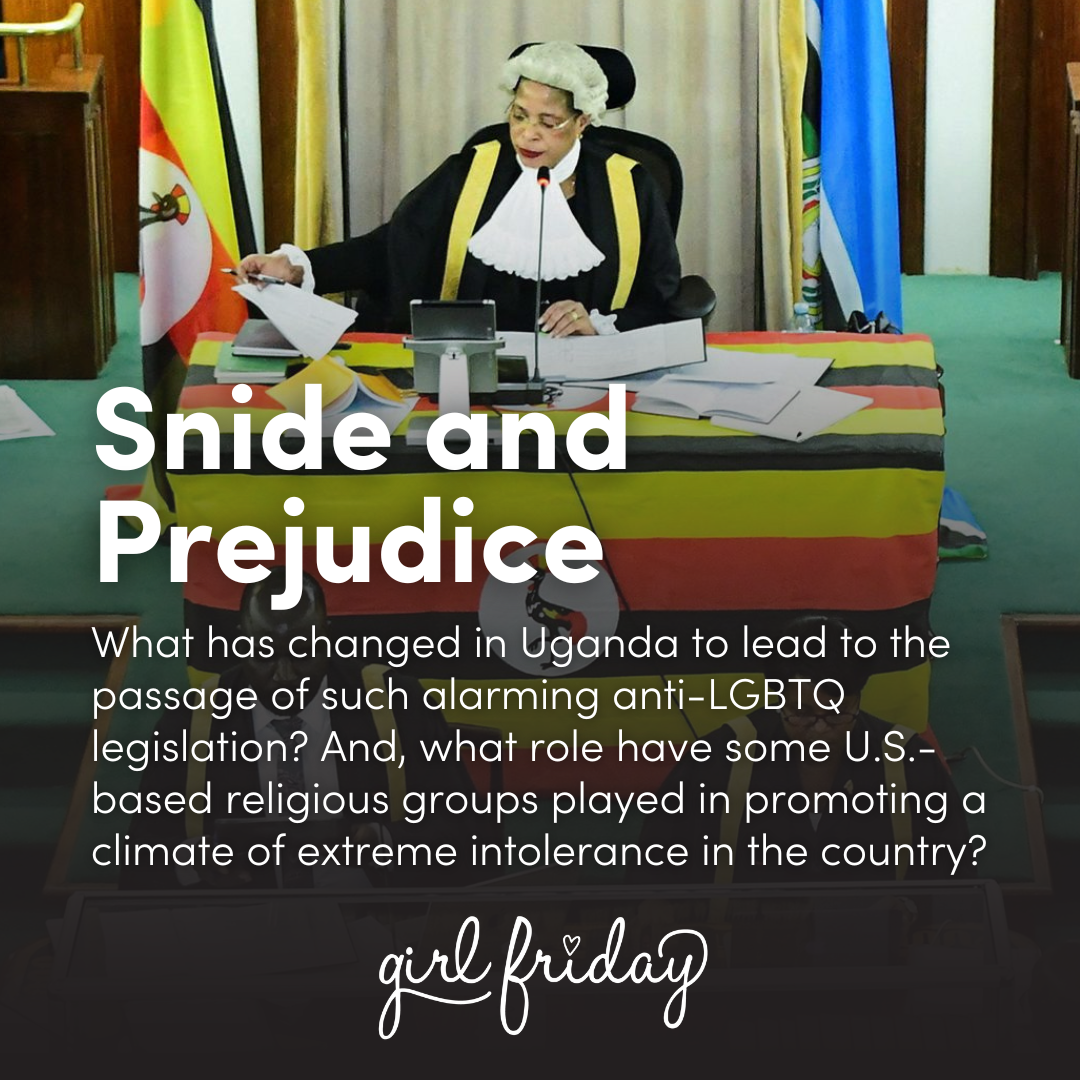Snide & Prejudice: Uganda Bows to Bigotry
On Tuesday, Uganda's parliament passed a law criminalizing individuals who identify as LGBTQ. This is now one of the world's most punitive and discriminatory laws against the LGBTQ community. Punishments for offenses are steep, including jail time and even the death penalty in some cases. What can we do to stand up for the LGBTQ community in Uganda?
Conspiracy theories on social media.
More than thirty nations in Africa, including Uganda, currently ban same-sex relationships. However, according to Human Rights Watch, the new law in Uganda seems to be the first to criminalize simply identifying as part of the LGBTQ community. What has changed in Uganda to lead to such draconian legislation? Al Jazeera found that on social media, there are numerous conspiracy theories alleging that "international forces" are spreading homosexuality. For example, in Kenya, Archbishop Jackson Ole Sapit of the Anglican Church allegedly voiced a peculiar hypothesis that homosexuality was a plot by environmentalists to reduce the population and curb the effects of climate change.
The role of American religious extremists.
In response to the new law, U.S. Secretary of State Antony Blinken tweeted, "the Anti-Homosexuality Act passed by the Ugandan Parliament yesterday would undermine fundamental human rights of all Ugandans and could reverse gains in the fight against HIV/AIDS. We urge the Ugandan Government to strongly reconsider the implementation of this legislation." While President Biden's administration is firmly opposed to Uganda's new law, there are specific American religious groups that are partially responsible for the discriminatory law's origins and the overall climate of extreme intolerance. Since 2007, more than 20 American religious organizations have spent roughly $54 million "advocating against LGBTQ rights, safe abortion, access to contraceptives and comprehensive sex education" in Africa. OpenDemocracy found that nearly half of that sum was spent in Uganda.
Steep punishments for violating the law.
Volker Türk, the UN’s High Commissioner for Human Rights, said in an official statement that if enacted, the Ugandan law would "render lesbian, gay and bisexual people in Uganda criminals simply for existing, for being who they are. It could provide carte blanche for the systematic violation of nearly all of their human rights and serve to incite people against each other.” Same-sex relations were already outlawed in Uganda, but this measure takes even more punitive measures by making it illegal to even identify as part of the LGBTQ community. Further, the punishments for offenses include lengthy jail sentences and even the death penalty for "aggravated homosexuality," which is defined in part as engaging in sexual acts while being HIV-positive. Amnesty International notes that the law includes vague language and even criminalizes people who "promote homosexuality."
Support the Stephen Lewis Foundation (SLF). This foundation was co-founded by Stephen Lewis, a Canadian diplomat who worked with the United Nations for two decades and served as the UN Secretary-General’s Special Envoy for HIV/AIDS in Africa from June 2001 until the end of 2006. SLF is "rooted in the principles of social justice, international solidarity, and substantive equality" and was developed "with the express purpose of supporting community-led organizations working on the frontlines of the HIV pandemic in sub-Saharan Africa."
They are working to end discrimination: "SLF partner organizations, run by and for LGBTIQ communities, provide healthcare – including HIV prevention, testing and treatment – peer support and counseling, and legal and economic support. They are committed to repealing homophobic and transphobic laws, building inclusive communities, and ensuring the health and human rights of all LGBTIQ individuals through legal action and advocacy." Interested in helping? Join their Partners in Pride Campaign.
They recognize the powerful role of grandmothers: SLF helps grandmothers who are "developing networks and organizing to claim their human rights and collectively advocate for secure futures at local, national, and international levels." Kenneth Mugayehwenkyi, Chair of the Grandmothers Consortium in Uganda, said “…in the village where we work, grandmothers are leaders. Grassroots mobilization has given grandmothers back their lives … this goes way beyond recovery, way beyond reclaiming what was lost. This is something brand new these women are doing. Something entirely new the world has never seen before.” If you would like to boost those efforts organized by women and support SLF's other initiatives, you can donate here.


